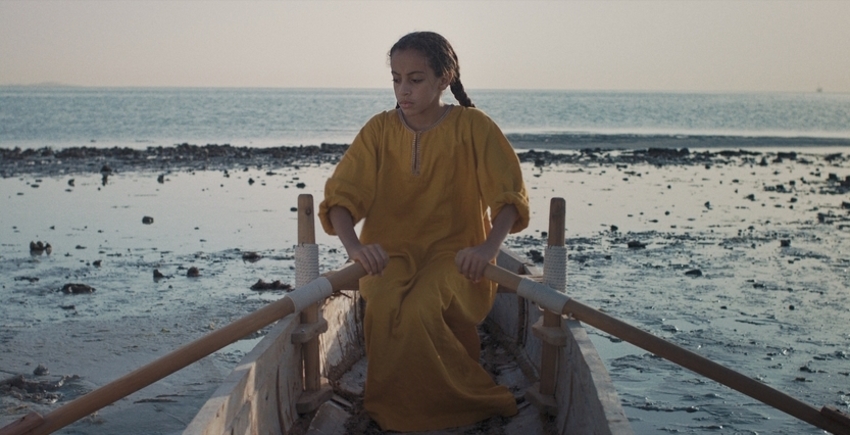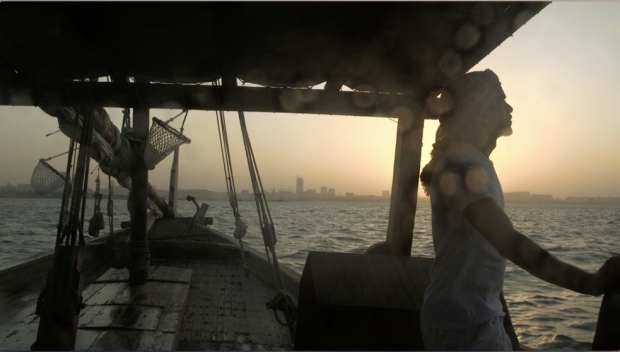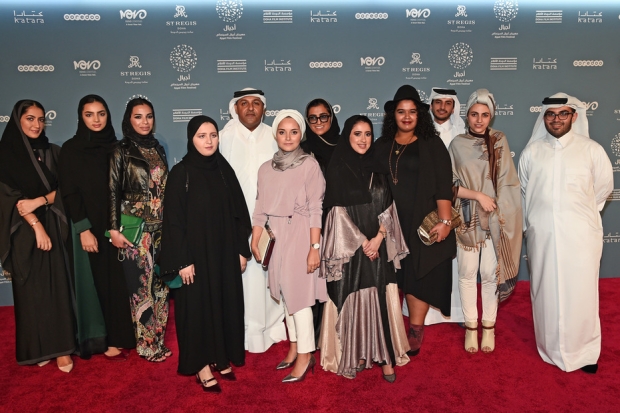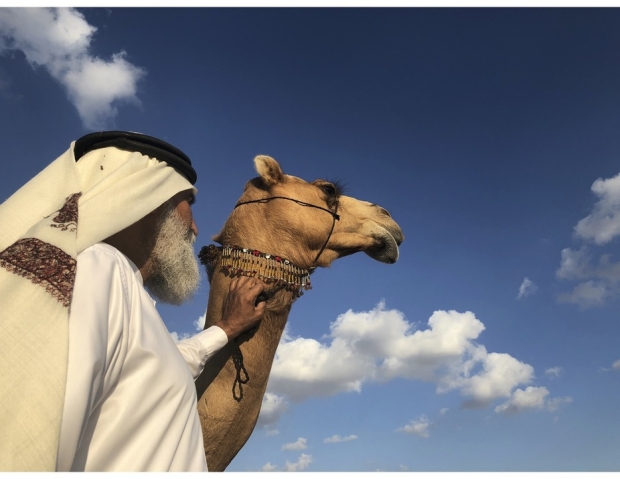Qatar's Ajyal Film Festival: The good, the promising and the unspoken

DOHA - Ajyal, the Arabic word for "generations," was born out of the ashes of the defunct Doha Tribeca Film Festival, the luxurious film jamboree that ran from 2009 until 2012.
Instead of launching another major regional film fair, Doha Film Institute CEO Fatma Hassan Alremaihi and her board chose to found a festival partially overseen by, and directed toward, youth and families.
We don't shy away from bringing mature subjects to the table. We underestimate how youth think; how smart they are and how receptive they can be
- Fatma Hassan Alremaihi, chief executive, Doha Film Institute
In other words, glamour, publicity and the Arab world's addiction to extravagance took a backseat to the movies at Ajyal, now in its sixth year.
"It's all about the youth. It's all about the filmmakers. It's all about the films themselves," Remaih, the festival's director, told Middle East Eye. "The packed theatres and the engagement of the youth this year show that the community now understands what the festival is for and what the festival can do for the kids."
This year's edition, from 28 November to 3 December, showed 81 films from 36 countries, including 24 films from the Arab world and 44 by women filmmakers. The wide-ranging selection included Cannes favourites Capernaum by Lebanese Nadine Labaki, Weldi (Dear Son) by Tunisian Mohamed Ben Attia, and 3 Faces by Iranian Jafar Panahi.
Stay informed with MEE's newsletters
Sign up to get the latest alerts, insights and analysis, starting with Turkey Unpacked
Yet neither Labaki's gritty, painful tale about street children nor Panahi's subtle meditation on the changing role of women artists in post-revolution Iran are exactly the kind of movies you would expect to see in a children's film festival. This was also the case for several other entries. Ajyal, thus, has continuously and boldly ventured to redefine what defines family cinema.
"We don't shy away from bringing mature subjects to the table," Remaij said. "We underestimate how youth think; how smart they are and how receptive they can be. When you create an environment where you not only show films but you also bring people to discuss the questions on the back of their minds, they end up taking the best out of these materials."
Other less obvious family fare included Marco Proserpio's Italian documentary, The Man Who Stole Banksy, an examination of the convoluted and volatile relationship between art and politics through a larger-than-life tale about two Palestinian men who stole a piece of Banksy graffiti in Bethlehem.
Hsin Yin Sung's Taiwanese animated feature, On Happiness Road, is an affecting chronicle of the changes that swept Taiwan over the last three decades as seen from the point of view of a thirty-something woman, and Naziha Arebi's incendiary opening film, Freedom Fields, is a non-fiction chronicle of post-revolution Libya as experienced by the country's female national football team.
Ajyal offered a variety of side activities this year, such as a silent performance by the Arab Puppet Theater Foundation that tackles migration and exile and a couple of masterclasses by renowned French-Tunisian graffiti artist, eL Seed and Capernaum's Lebanese music composer, Khaled Mouzanar.
Qatari films
Most notable of the bunch, however, was Re(action), a group exhibition featuring the works of 12 Qatari-based filmmakers and visual artists that review some of the most pertinent topics of the moment: the World Cup, freedom of expression and Saudi journalist Jamal Khashoggi, who was killed on 2 October in Saudi Arabia's Istanbul consulate.
The group exhibition arrived on the heels of last year’s similarly themed Le Blockade, which explored different aspects of the economic and political siege imposed by Qatar's Arab neighbours in June 2017. A sense of defiance and resilience permeated Re(action). It did not shy away from engaging with current affairs of the region yet it refrains from looking inward and delivering full-blown self-criticism.
In this regard, the most unintentionally revealing programme of Ajyal was the "Made in Qatar" competition. This popular programme was comprised of 16 short films directed by up-and-coming Qatar-based filmmakers. Genres range from animation and fiction to documentaries and experimental films.
Apart from a handful of entries, the shorts were aesthetically lacking. Often clumsily narrated, these efforts came across as competent, if uninspiring technical exercises that looked and felt like corporate videos, rather than cinema. They lacked not only visual experimentation but thematic sophistication and were marred by excessive use of music, hammy acting and sentimentality.
Feminist theme
A dominant theme in the programme was feminism. Three films tackled the subject in the same straightforward fashion. Mahdi Ali Ali's silent comedy, Amphitheater – the standout film of the selection – follows a young woman as she rebels against her father over the course of an ill-fated family outing.
Amal al-Muftah's best film winner, Sh'hab, centres on a fiercely independent eight-year-old girl who brushes off her male companion's offer for help in her search for a falling star. Nouf al-Sulaiti's Gubgub revolves around a young girl attempting to outdo her brother in crab fishing after her father dismisses her modest catch.
At their core, the three films featured fiercely independent girls requiring no patronage from their male counterparts. All three bluntly reject patriarchy, aspiring not only to be equal to the men around them but to live and behave in whichever way they wish.
Gender remains a key issue in the Qatari cultural discourse, but, as exhibited by these aforementioned stories, it’s no longer a taboo. The same cannot be said about class, race and regional conflicts.
Freedom and privilege
Khalifa AlMarri's Voyager is ostensibly about a thirtysomething Qatari traveller embarking on a motorcycle journey across the world. At the bottom of this handsomely shot documentary, however, is a vain account of a rich native (who openly displays his national pride, dedicating his accomplishments to Qatar's emir, Tamim bin Hamad Al Thani) whose quest for freedom comes from a place of privilege, rather than being a real struggle.
Like Voyager, Ibrahim Nashat's A Moment in the Wind is another tale of privilege. Omar, the Egyptian man at heart of the story, is affluent enough to leave his primary work and pursue his passion for kite surfing. In the documentary's epilogue, Nashat casually states that Omar's business is now divided between Qatar and Egypt.
The repercussions of the Saudi-led blockade on his business or his status as a citizen of a nation that is antagonistic towards Qatar are not touched upon in the slightest. The picture Nashat paints of this Egyptian man is too neat, too shallow.
No one can deny that we don't live in a perfect community. We all have our flaws. But there's a space to be better, in every way.
- Fatma Hassan Alremaihi, chief executive, Doha Film Institute
More authentic is Sudanese-Egyptian Eiman Mirghani's The Bleaching Syndrome, an investigation into bleaching practices carried out by Sudanese women. Like most films in the programme, Mirghani does not dig deep into the subject, never questioning her position as a mixed-race female resident in Qatari society.
Yet Mirghani should be lauded in opening up a discussion about racism and the traditional discriminative standards of beauty in the Arab world. The form is artless, yet the subject matter, compared to the rest of the selection, is quite daring.
Longing and confusion
More accomplished, and rawer, is Egyptian visual and time-based media artist Hadeer Omar's The Reason, July 2017. It is a wordless experimental film essay whose combined footage of Doha and Egypt functions as a stream of consciousness reflecting both a longing and confusion about her home country and her adopted homeland.
Equally raw is Yemeni-Russian journalist Mariam al-Dhubhani's best documentary winner, Just Another Memory. A deeply personal look at the aftermath of the ongoing war in Yemen, the film is a quiet, graceful meditation on loss and displacement that doubles as a memoir of a tragedy ignored by the world at large.
While there are various taboos that remain intact in Qatar, self-censorship plays a key role in informing the content of art. There was plenty to chew on in the Made in Qatar programme, yet it is palpable that filmmakers often hold back, both through a deficiency in artistic maturity and a wariness of fishing into troubled waters.
"This is a conservative community whose members lived most of their lives as such, so self-censorship is certainly a reality. No one can deny that we don't live in a perfect community. We all have our flaws. But there's a space to be better, in every way. This is one of the rationales informing the programming of Ajyal," Remaih said.
You have to be mindful though about who your audience is, because if you are not, you may lose them and never regain their trust
- Fatma Hassan Alremaihi, chief executive, Doha Film Institute
"We try to bring films that push the envelope while teaching the viewer something about humanity and the world. You have to be mindful though about who your audience is, because if you are not you may lose them and never regain their trust."
Make no mistake, Qatar remains a religiously conservative nation. Alcohol is still not served outside hotels, criticism of the government and the ruling family by the press remains disallowed, if not entirely prohibited. There's certainly a long way to go for foreign workers to gain full rights and enjoy full freedoms. Yet the leap Qatar has made in building a just and healthy society must be acknowledged and fostered.
Absence of neighbours
The other elephant in the room is the expected absence of films from the blockade-enforcing countries. Ajyal invited a number of filmmakers from the blockade countries who "respectfully declined our invitation since they're worried about their situation," according to Remaih.
"We worked with filmmakers from Egypt, UAE and Saudi Arabia for a long time. We will always invite filmmakers from these parts of the Arab world and it's up to them whether to accept or decline our invitation," Remaih said.
"We understand their situation completely. We'd love to work with them, but understand that they cannot at the moment. We hope to work with all these filmmakers when this situation becomes a thing of the past."
Middle East Eye delivers independent and unrivalled coverage and analysis of the Middle East, North Africa and beyond. To learn more about republishing this content and the associated fees, please fill out this form. More about MEE can be found here.








